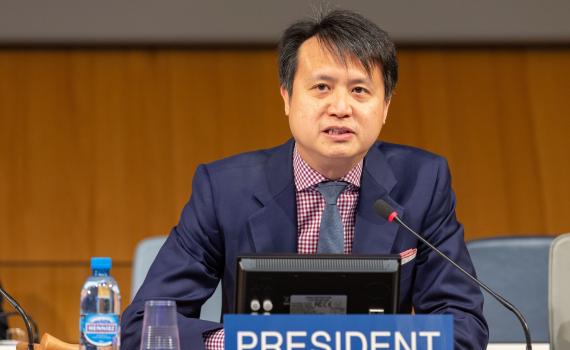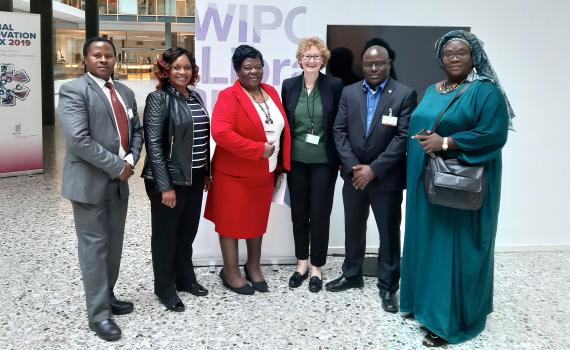
In May 2020, member states of the World Intellectual Property Organization (WIPO) appointed Mr Daren Tang to WIPO’s top job in Geneva. As leader of WIPO, the global body that sets international law and policy on intellectual property issues, the new Director General takes charge of an organization whose direction on copyright determines how libraries do their work, especially in the digital environment. In this blog, Teresa Hackett, EIFL Copyright and Libraries Programme manager introduces the new Director General and sets out hopes for libraries under his leadership. EIFL has congratulated Tang on his appointment.
A generational shift at WIPO
On 8 May 2020, WIPO member states appointed Mr Daren Tang as the new Director General (DG), heading up the organization for the next six years. Tang is only the fifth DG to be appointed at WIPO, and the first to hail from outside the organization: he currently serves as Chief Executive of the Intellectual Property Office of Singapore (IPOS). He is also the first candidate from Asia.
Tang represents a generational shift at WIPO. Coming from Singapore, a small city-state that prides itself as Asia’s technology capital, Tang comes with a keen understanding of how digital technologies have significantly altered the way works are created, distributed and used by people today.
A strong national track record
Tang also comes to WIPO with a strong national track record. In 2019, IPOS and the Ministry of Law published its detailed review of Singapore’s copyright act. Key recommendations in Singapore’s biggest copyright reform in 30 years include several provisions that will assist libraries in their work. For example, existing copyright exceptions for libraries, archives, museums and galleries are enhanced, new exceptions for text and data mining, and educational uses in schools are introduced, restrictions on the making of copies for persons with print disabilities are eased, and the general ‘fair use’ exception is strengthened. Importantly for digital content, certain provisions, including the library exceptions, are protected from override by terms in digital content licences.
Further, a transparent two-year consultation process on the new law helped ensure that the voices of all stakeholders were heard. And to improve understanding by professionals and the general public alike, the law is to be completely re-structured and re-written. Once drafted, there will be a final public consultation on the bill before it is adopted as law.
In his new role in Geneva, we hope that Tang can also bring analysis and evidence-based policy-making to WIPO's work. For example, by utilizing the Department for Economics and Data Analytics, led by WIPO's Chief Economist, to assess the economic effects of IP policy choices to help inform policy debates and WIPO norm-setting activities.
New impetus and fresh focus
 While Tang is a WIPO ‘outsider’, he is a familiar face in Geneva because since 2017 he has served as Chair of WIPO’s Standing Committee on Copyright and Related Rights (SCCR). The SCCR, which meets twice a year in Geneva, examines issues of substantive law or harmonization in the field of copyright and related rights.
While Tang is a WIPO ‘outsider’, he is a familiar face in Geneva because since 2017 he has served as Chair of WIPO’s Standing Committee on Copyright and Related Rights (SCCR). The SCCR, which meets twice a year in Geneva, examines issues of substantive law or harmonization in the field of copyright and related rights.
The committee is currently discussing two main issues: limitations and exceptions for cultural heritage institutions (libraries, archives and museums), education and persons with disabilities (other than print disabilities), and the protection of broadcasting organizations, as well as the broader role of copyright in the digital environment.
Since 2011, EIFL and our partners have been advocating at WIPO for an international instrument on copyright limitations and exceptions to properly support the work of libraries in the digital age, for example, to assist the delivery of online education, document supply services, and digital preservation.
While most WIPO regional blocs, including the African Group, the Group of Latin American and Caribbean Countries (GRULAC), and the Asia Pacific Group have shown strong support for libraries over many years, rich, industrialized countries, especially the European Union, have consistently opposed any action.
We hope that in his new role as Director General, Tang will bring new impetus into the work of SCCR, and will help guide the committee towards meaningful progress and concrete, positive outcomes for libraries and the communities we serve.
We also hope that Tang, who is from a young, newly industrialized country, will provide a fresh focus on development issues at WIPO, and the role of a balanced IP system in supporting economic, social and cultural development. For example, through WIPO’s support for attainment of the Sustainable Development Goals (SDGs), mainstreaming of the WIPO Development Agenda across all WIPO activities, and a critical examination of the role of WIPO technical assistance programmes to member states.
In addition, we hope that Tang can ensure independence and neutrality at the WIPO Secretariat. In 2019, EIFL and our partners in civil society have expressed frustration at the format and composition of several high profile WIPO events on copyright limitations and exceptions that prevented, in our view, a fair and balanced discussion from taking place. We fully expect the new DG to ensure that the highest ethical standards are applied.
Big global challenges
Tang will take up his new role in October 2020 at a time of unprecedented global change and uncertainty. The threat of climate change (the theme of World IP Day 2020 was ‘Innovate for a Green Future’), and now the COVID-19 pandemic, are gripping the world.
COVID-19 raises important issues related to copyright. As libraries around the world have urgently shifted operations online to support education, research and communities, the challenges of compliance with copyright laws have been brought sharply into focus. Ideally every country needs to have a good range of digital exceptions for libraries, research and education, a flexible fair use-type exception, and a provision that protects the exceptions from being overridden by licence terms.
However, we know from WIPO studies that the copyright laws of most developing countries are wholly inadequate in terms of exceptions. To ensure that people everywhere can enjoy quality education in all circumstances, and can fully benefit from the use of new educational technologies, an international copyright framework is needed more than ever so that no nation is left behind.
In a written statement to the WIPO Assemblies on the appointment of Tang, EIFL set out our hopes for his term as Director General, and in a letter of congratulations, EIFL looked forward to working the new DG on library copyright issues and priorities, and to sharing ideas on how WIPO can best respond to the big global challenges facing our institutions.
- Read Daren Tang’s acceptance speech.
- Read more about why EIFL is advocating for an international treaty for libraries and archives.
SHARE / PRINT







